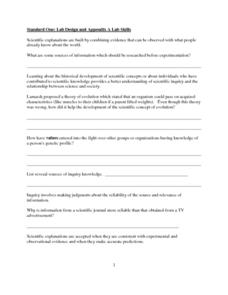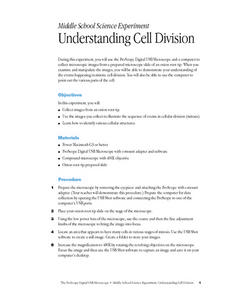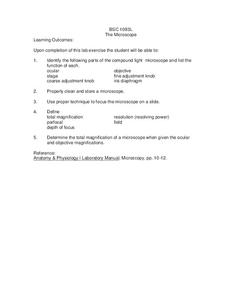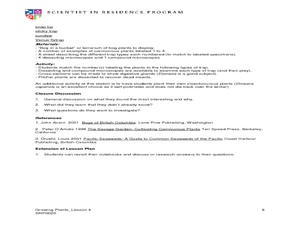Curated OER
Microscopes: Is what you see, what you got?
Eighth graders identify the parts and functions of the microscope. For this biology lesson, 8th graders observe different samples under different types of microscopes. They compare and contrast the details they see.
Curated OER
Algae Part One: An Introduction
Students have the opportunity to view two types of algae under 400x magnification with a compound microscope. They make observations and record their observations through drawings and words. In addition, they identify different qualities...
Curated OER
Standard One: Lab Design and Appendix A Lab Skills
In this lab design and lab skills worksheet, high schoolers answer questions about experimental design including finding variables, determining controls, and graphing data. They answer questions about microscopy and label the parts of a...
Curated OER
The Nature of Salt
Young scholars record information from the periodic table for sodium and chloride. They determine whether salts are molecular or ionic compounds, along with sodium chloride's molecular weight, and relative weights
Curated OER
Understanding Cells
Learners identify and define several related vocabulary terms. Students complete a short lab and complete the questions. Learners create a cell crossword puzzle and play cell computer games through the included links.
Howard Hughes Medical Institute
Small-Molecule Diversity
One way to study the microscopic is to make it macroscopic. Each slide of the lesson presentation presents a different molecular model along with a brief description of the compound's function. Learners use the information to build...
Curated OER
Understanding Cell Division
Learners collect and describe cells from an onion root tip which are undergoing the stages of cell division. They use a ProScope USB microscope to identify and compare cells in five phases of mitosis.
Curated OER
Microscopes and Telescopes
Students analyze a microscope and study what they do. In this investigative instructional activity students study how microscopes were first invented, and how ray diagrams are used in conjunction.
Curated OER
Cells: The Units of Life
In this cells worksheet, 9th graders identify and use a microscope to look at cells. They explain the purpose for a microscope and how to find the total magnifying power of a microscope. Students also determine what would cause an image...
Curated OER
Elegant Embryology
Students observe embryogenesis in action through early stages of development of eggs. They observe cultures with dissecting and compound microscopes. They draw their egg, record any details and observe for changes. They compare their...
Curated OER
Composting in Schools: Observing Compost Microorganisms
Students explore composting. In this composting instructional activity, students use compound microscopes to observe the microbial communities in compost. Observations and documentation of changes will occur over the course of several...
Curated OER
Are Fruits And Vegetables Really Made of Cells?
Pupils design and carry out an exercise to determine if a given fruit or vegetable is composed of cells. They dissect out sections of the fruit or vegetable, prepare stained slides, and make observations under a compound microscope.
Curated OER
Introduction to Biology
Students examine a microscope and learn its functions. In this microscope lesson students prepare a wet mount slide and complete calculations.
Curated OER
The Microscope
In this microscope lesson students explore the compound light microscope. Students discover techniques concerning cleaning, storage and proper use of the microscope. Students discover the working parts of the compound light microscope as...
Curated OER
Size and Shape
Students observe different substances under the microscope. In this space science instructional activity, students identify the different features of SEM images. They formulate a conclusion about the images of Mars meteorites.
Curated OER
Integrating Technology: Seeing Atoms: STM
In this atom worksheet, students learn about the scanning tunneling microscope and answer questions about its use, how it works and its ability to see electrons in atoms.
Curated OER
Sedimentary Rocks
Fourth graders discuss the basic properties of rocks, the processes
involved in the formation of soils, and the needs of plants provided by soil. They write descriptions in their Science journal and identify and discuss each type of...
Curated OER
Plankton / Phytoplankton
Students discuss the importance of plankton in the ocean ecosystem. In this biology lesson, students identify the different types plankton by observing them under the microscope. They explain how plankton population affect global climate.
Curated OER
Microscopy Exercises
Students explore organisms and botany by utilizing microscopes. In this microscopic research lesson, students define many plant and organism related vocabulary terms such as conifers, moss and spores. Students view spores and other...
Kenan Fellows
Microorganisms in Pond Water
That is living in the water? Groups of two to three view pond water with microscopes in order to find microorganisms. They draw pictures of the ones they find in their slides. The groups compare their drawings to pictures of common...
Curated OER
Endosymbiosis: A Friend Within
Young scholars research the ecological principle of symbiosis. Using a microscope, students observe the relationship of mutualism between termites and flagellates. Young scholars examine a live termite and protozoans. They discuss the...
Curated OER
Connect the Species
Fourth graders, in pairs, explore energy transfer and species interrelationships by viewing slides on a microscope. hey explore phytoplankton (producers) and zooplankton (consumers)
National Nanotechnology Infrastructure Network
Introduction to Nanotechnology Using the Creative Problem-Solving Model
Should we continue to spend money on nanotechnology? Groups engage in a problem-solving unique process around the newly emerging research field of nanotechnology. In order to propose a solution, the groups must research nanotechnology...
Curated OER
Matter: All That "Stuff"
In this chemistry worksheet, students learn about matter, including atoms, electrons, protons, neutrons, compounds and chemical properties. They use this information to answer the 10 questions on the worksheet. The answers are on the...























